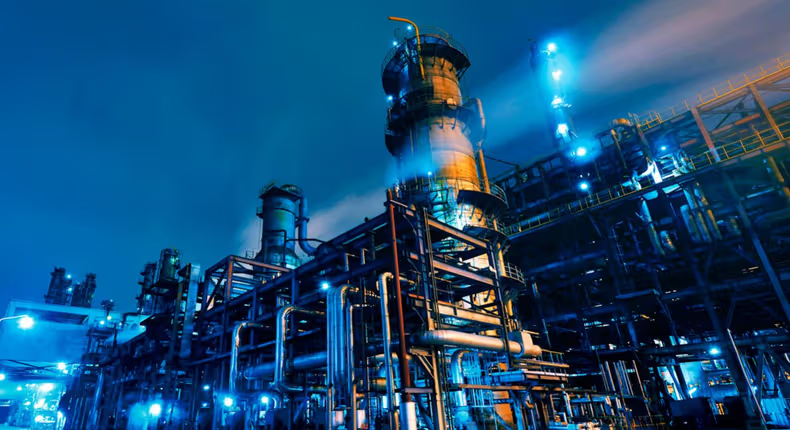Strategic infrastructure initiatives, international alliances, and regulatory reforms are helping to establish the country as a vital energy center in southern Africa.
Partnerships with other oil-producing African countries
As recently reported, Mozambique’s state-owned company, Petromoc, following in the footsteps of Aliko Dangote, has decided to establish an oil refinery.
This would make it the country’s first oil refinery.
To this effect, Petromac signed a memorandum of understanding with Nigeria’s Aiteo.
“This project, to be implemented over a maximum period of 24 months, will increase storage capacity by 160,000 metric tonnes for liquid fuels and 24,000 metric tonnes for Liquefied Petroleum Gas,” the President of Mozambique, Daniel Chapo.
The president also emphasized the project’s potential for lowering petroleum imports, creating jobs, and increasing the country’s GDP.
“The refinery will produce gasoline, diesel, naphtha, and Jet A1 with the ambition of conquering the regional market,” he added.
The refinery intends to fulfill domestic gasoline demand while also facilitating exports to neighboring nations, and construction is expected to be finished within two years.
Similar to Nigeria prior to its present refining capability, Mozambique is said to import the most refined oil products, with India being the main provider, followed by Saudi Arabia, Bahrain, Malaysia, and the United Arab Emirates, as seen in the Punch.
Additionally, Mozambique and Zambia have agreed to build a $1.5 billion gas pipeline. This pipeline will carry 3.5 million tons of petroleum products from Mozambique’s port city of Beira to Ndola, Zambia.
The project involves the building of storage facilities in both nations and is projected to be completed within four years. This effort seeks to increase energy security and promote economic cooperation between the two countries.
Other energy initiatives
The board of the United States Export-Import Bank in March, 2025, authorized a roughly $5 billion loan for a long-stalled LNG project in Mozambique, a significant step toward resuming development headed by French oil giant TotalEnergies.
TotalEnergies initially projected that the Mozambique LNG project will be operational by 2029. However, earlier this year, the corporation announced that this schedule is no longer realistic.
In September, reports showed that the Bank was considering financing a liquefied natural gas (LNG) project led by Eni SpA off Mozambique’s coast.
This was coming years after backing an onshore LNG facility that has faced delays due to security concerns and opposition from environmental groups.
Estevão Pale, Mozambique’s Energy Minister, stressed the project’s importance for global energy security and the country’s economic development. TotalEnergies’ CEO, Patrick Pouyanné, reiterated the company’s commitment to restarting the project, which is slated to start producing gas in 2029.
The project involves the building of storage facilities in both nations and is projected to be completed within four years. This effort seeks to increase energy security and promote economic cooperation between the two countries.
Other energy initiatives
The board of the United States Export-Import Bank in March, 2025, authorized a roughly $5 billion loan for a long-stalled LNG project in Mozambique, a significant step toward resuming development headed by French oil giant TotalEnergies.
TotalEnergies initially projected that the Mozambique LNG project will be operational by 2029. However, earlier this year, the corporation announced that this schedule is no longer realistic.
In September, reports showed that the Bank was considering financing a liquefied natural gas (LNG) project led by Eni SpA off Mozambique’s coast.
This was coming years after backing an onshore LNG facility that has faced delays due to security concerns and opposition from environmental groups.
Estevão Pale, Mozambique’s Energy Minister, stressed the project’s importance for global energy security and the country’s economic development. TotalEnergies’ CEO, Patrick Pouyanné, reiterated the company’s commitment to restarting the project, which is slated to start producing gas in 2029.
Currently, Rwanda imports all its petroleum product requirements due to the absence of local production.
However, with this recent discovery, the country is poised to join the ranks of Africa’s oil-producing nations, alongside major players like Algeria, Nigeria, and Egypt.
Also, Namibia, the world’s third-largest uranium supply, is on the verge of becoming a significant oil and gas producer. Energy corporations like Total Energies and Shell have discovered an estimated 2.6 billion barrels, with commercial production beginning as early as 2029.
Source: https://africa.businessinsider.com/local/markets/another-african-country-is-making-an-aggressive-push-to-become-a-major-oil-player/pcd96zv

